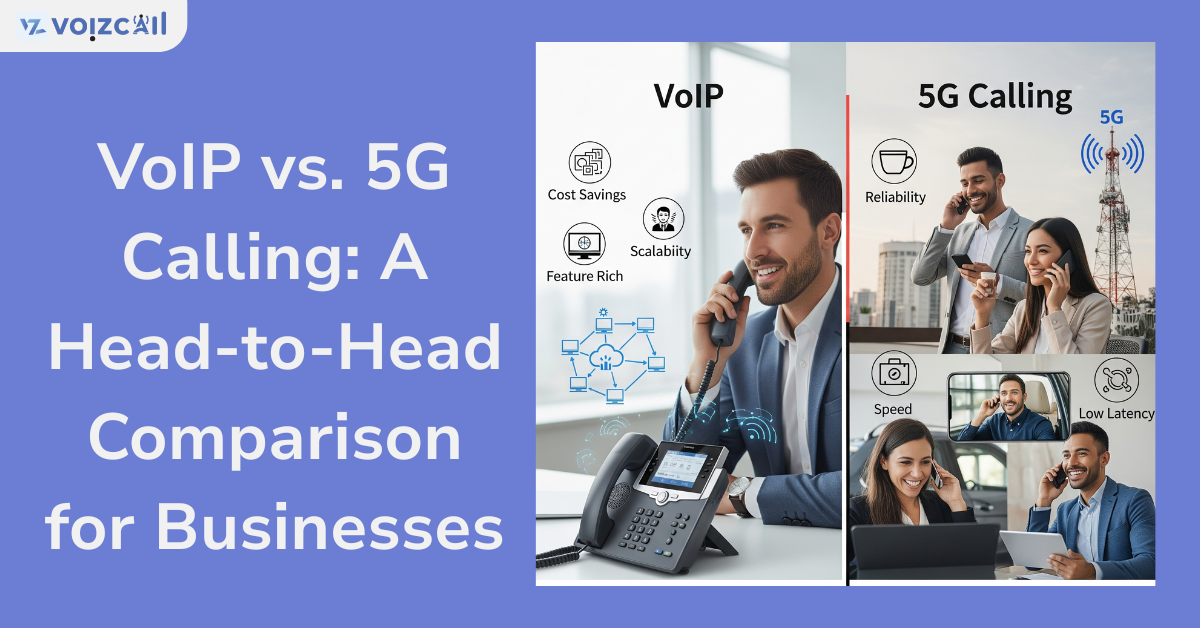


05/Aug/2025
Due to the emergence of two concepts namely VoIP (Voice over Internet Protocol) and the introduction of 5G calling, most businesses are wondering which one is more superior to me? Both of them are the solutions of instant, modern communication that does not have the restrictions of old-school phone lines, but operate in drastically different ways.
In this we are going to breakdown the major differences between VoIP and 5G calling, to help you decide how on which solution to use on your business, whether a remote startup, a fast-growing business, or you are simply looking to cut the cost of communication.
And now this daring, this taking the bull by the horns, this square unbuttoning, this putting the fancy to sleep so that it sees no more (a conversation, by the way, that a gentleman overhears, this overhanging) Lets go in shall we?
VoIP (Voice over Internet Protocol) enables you to phone your friends via the net- not the physical phone lines. VoIP has services such as Zoom, Microsoft Teams, and Voizcall, RingCentral, among others, which allow its users to call their PCs, mobile phones, or IP smartphones.
The major VoIP advantages to a business:
Works on the Wi-Fi or broadband connection
Low-cost or free calling plans
Value-added functions such as call recording, voicemail-to-mail and virtual receptionists
Scalable and Easy to manage on remote teams
Is able to integrate CRMs and business tools
VoIP is one of the common business call solutions as it is flexible and affordable, and runs on clouds.
5G calling uses the next generation of mobile networks to make voice and video calls. It doesn’t need Wi-Fi or broadband — just a 5G-enabled phone and a mobile plan.
Key Benefits of 5G Calling:
Fast connection speeds with low latency
Great for mobile employees and field workers
No need for apps or internet access — just a phone signal
High-definition voice and video quality
Works well even in busy areas or during peak hours
5G is changing how mobile workers and on-the-go businesses stay connected.
VoIP vs. 5G Calling: What is the Difference?
So how do the two compare side by side?
|
Feature |
VoIP Calling |
5G Calling |
|
5G cellular network using Network Internet (Wi |
Fi or Ethernet) |
5G cellular network using Network Internet (Wi |
|
Devices |
Works on desktop, mobile, softphones |
5G smartphones |
|
Mobility |
Needs internet connection |
Truly mobile – no Wi-Fi needed |
|
Price Tends to be cheaper especially international More expensive (depends on mobile plan) |
Characteristics Voicemail, call forwarding, CRM connection Typical voice and video callFeatures |
|
|
Price Tends to be cheaper especially international More expensive (depends on mobile plan) |
Characteristics Voicemail, call forwarding, CRM connection Typical voice and video callFeatures |
|
|
Best For |
Remote teams, offices, global businesses |
Mobile teams, outdoor staff, field agents |
Which One Is Better for Your Business?
The answer depends on how your business operates:
Call / Email for Sales Inquiry Today
Choose VoIP if:
You have remote or hybrid employees
You want to reduce international calling costs
You should have such business functionality as auto-attendants, call routing, or integration with CRM integration
Your crew operates with the use of laptops, PCs, or one of the VoIP phones
Choose 5G Calling if:
Your team is always on the move
You have field workers, drivers, or mobile technicians
You need calls to work even when Wi-Fi isn’t available
You don’t need advanced call management features
Can VoIP and 5G Work Together?
Yes! In fact, many businesses combine both.
VoIP handles office calls, team communication, and customer support
5G supports field agents or employees in areas without Wi-Fi
Together with cloud-based VoIP and 5G-enabled mobile device use, you have flexibility, mobility, reliability, and above all have the best of two worlds.
Conclusions: Selecting an Appropriate Business Calling Solution
VoIP and 5G are both future-ready calling options, but they solve different problems.
VoIP is the clear winner for most office-based, remote, or international businesses
5G calling serves the best fit to mobile-first groups and on-the-move professionals
Consider your everyday working style of the team before you make a decision. Are they desk workers or field workers? Do you need smart call features or just fast mobile access?
In the future, or by 2025 to be exact, the combination of the potency of VoIP services and the velocity of 5G will be called a hybrid calling strategy and applied by smart businesses.